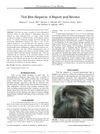 10 citations,
February 2011 in “Journal der Deutschen Dermatologischen Gesellschaft”
10 citations,
February 2011 in “Journal der Deutschen Dermatologischen Gesellschaft” The document concludes that proper diagnosis and evidence-based treatments are crucial for managing hair diseases, and psychological support for patients is important.
 9 citations,
January 2017 in “Journal of the Egyptian Women's Dermatologic Society (Print)”
9 citations,
January 2017 in “Journal of the Egyptian Women's Dermatologic Society (Print)” Fungal infection was the main cause of hair loss in Egyptian children studied.
 3 citations,
November 1999 in “Journal of Cutaneous Medicine and Surgery”
3 citations,
November 1999 in “Journal of Cutaneous Medicine and Surgery” Examining scalp biopsies in different ways helps better diagnose hair loss types.
 2 citations,
July 2018 in “Elsevier eBooks”
2 citations,
July 2018 in “Elsevier eBooks” Trichoscopy is a useful tool for diagnosing and managing hair and scalp conditions, often better than traditional methods.
 1 citations,
November 2014
1 citations,
November 2014 The document explains hair and nail biology, common hair loss conditions and treatments, oral and genital skin diseases, and the risks and treatments associated with squamous cell carcinoma.
 January 2015 in “Springer eBooks”
January 2015 in “Springer eBooks” Some alternative treatments may help with hair loss, but more evidence is needed to confirm their effectiveness.
 83 citations,
June 2018 in “Frontiers in immunology”
83 citations,
June 2018 in “Frontiers in immunology” Certain types of T cells are essential for healthy skin and play a role in skin diseases, but more research is needed to improve treatments.
 25 citations,
May 2009 in “International Journal of Dermatology”
25 citations,
May 2009 in “International Journal of Dermatology” About one-third of dermatology patients in Ankara, Turkey use unconventional treatments for skin issues.
 3 citations,
August 2021 in “Cutis”
3 citations,
August 2021 in “Cutis” Some alternative medicine treatments might work for skin conditions, but their effectiveness and safety differ a lot.
 1 citations,
April 2015 in “Journal of Dermatology and Dermatologic Surgery”
1 citations,
April 2015 in “Journal of Dermatology and Dermatologic Surgery” People with certain skin diseases have higher levels of the hormone prolactin in their blood.
 22 citations,
May 2012 in “Dermatologic Therapy”
22 citations,
May 2012 in “Dermatologic Therapy” Doctors should suggest hair replacement based on personal needs and stress scalp cleanliness to avoid skin problems.
 103 citations,
January 2009 in “Carbon”
103 citations,
January 2009 in “Carbon” Pure carbon nanotubes are safe for mice, but impure ones cause immune issues and hair loss.
 35 citations,
October 2012 in “Dermatologic Clinics”
35 citations,
October 2012 in “Dermatologic Clinics” Autoimmune diseases can cause hair loss, and early treatment is important to prevent permanent damage.
22 citations,
January 2012 in “Mediators of inflammation” Nonantibiotic macrolides show promise for treating various inflammatory skin conditions.
11 citations,
February 2018 in “Medical science monitor” An alternating inflatable head pad reduced pressure ulcers and hair loss in heart surgery patients.
 4 citations,
March 2023 in “Journal of Cosmetic Dermatology”
4 citations,
March 2023 in “Journal of Cosmetic Dermatology” Carboxytherapy is a safe and effective treatment for improving skin appearance and treating various skin conditions, with mild side effects.
 44 citations,
July 2005 in “Aesthetic Plastic Surgery”
44 citations,
July 2005 in “Aesthetic Plastic Surgery” Hair transplantation successfully treated a woman's hair loss caused by a tight ponytail.
 1 citations,
October 2018 in “InTech eBooks”
1 citations,
October 2018 in “InTech eBooks” Only minoxidil and finasteride are FDA-approved for hair loss, with other treatments available but less effective or with side effects.
 February 2024 in “PloS one”
February 2024 in “PloS one” Tofacitinib and adalimumab are promising treatments for cicatricial alopecia with few side effects.
 41 citations,
August 2007 in “European Journal of Gastroenterology & Hepatology”
41 citations,
August 2007 in “European Journal of Gastroenterology & Hepatology” A woman's total hair loss from hepatitis C treatment grew back after stopping the medication.
 5 citations,
October 2018 in “Dermatologic therapy”
5 citations,
October 2018 in “Dermatologic therapy” Recognizing congenital triangular alopecia is crucial to avoid unnecessary treatments.
 5 citations,
April 2016 in “The American Journal of Dermatopathology”
5 citations,
April 2016 in “The American Journal of Dermatopathology” A tick bite caused temporary hair loss in a man, which is a rare condition that usually gets better within 3 months.
 January 2021 in “Skin appendage disorders”
January 2021 in “Skin appendage disorders” The report concludes that atypical Brauer nevus is more common in males, present at birth, and often misdiagnosed due to its unusual scalp locations.
 32 citations,
January 2006 in “Acta dermato-venereologica”
32 citations,
January 2006 in “Acta dermato-venereologica” SACUMAN, a rare condition causing hair loss without clear signs, is often misdiagnosed and needs scalp biopsies for accurate detection.
 23 citations,
January 2010 in “Journal of Medical Primatology”
23 citations,
January 2010 in “Journal of Medical Primatology” Hair loss in Rhesus macaques may be caused by a skin allergy-related condition.
 15 citations,
December 2013
15 citations,
December 2013 Men with more vanadium in their blood and who drink less soy milk are more likely to have hair loss.
 9 citations,
July 1995 in “Veterinary Clinics of North America: Small Animal Practice”
9 citations,
July 1995 in “Veterinary Clinics of North America: Small Animal Practice” The document concludes that hair loss in cats is caused by various factors, including allergies, mites, infections, and hormonal issues, with treatments varying accordingly.
 February 2024 in “International journal of biology, pharmacy and allied sciences”
February 2024 in “International journal of biology, pharmacy and allied sciences” Plant-based treatments can effectively and safely treat hair loss.
 December 2021 in “Razrabotka i registraciâ lekarstvennyh sredstv”
December 2021 in “Razrabotka i registraciâ lekarstvennyh sredstv” The gel form of substance Y is the most effective for treating hair loss.
 November 2017 in “Asian journal of pharmaceutical and clinical research”
November 2017 in “Asian journal of pharmaceutical and clinical research” Three compounds from Dadap leaves may help treat hair loss.



























